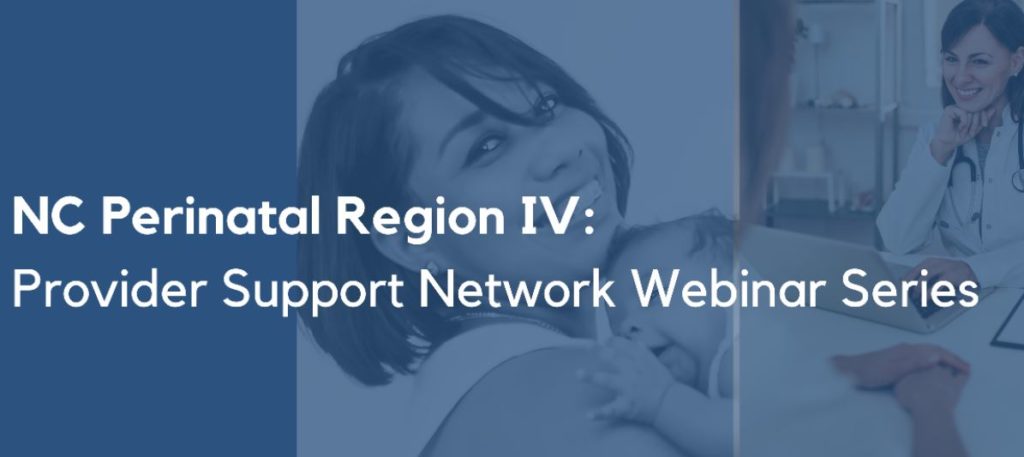NC Perinatal Region IV: Provider Support Network Webinar Series

This webinar series covers an array of topics related to maternal and neonatal health including perinatal safety, racial equity, substance use, appropriate levels of prenatal, intrapartum, postpartum, and well-woman care, and more. This is a free series crafted with the intention of disseminating the latest evidence-based best practices to the providers and nurses of Region IV. Through this network, we hope to share and learn so all providers and nurses are empowered to give the women, babies, and families of North Carolina Region IV the very best care.
“Pre-gestational Diabetes in Pregnancy” –Heatherly M. Smith, PA-C, CDCES – 2-part series
“Gestational Diabetes Mellitus Screening” Lecture –Samuel T. Bauer, MD
“The Role of Pelvic Physical Therapy in Perinatal Care”– Keeli Gailes DPT, ATC
“Cannabis Use During Pregnancy and Lactation.” – Jaimie Lea, MPH, IBCLC
“Covid-19 Vaccines and Pregnancy” — Brenna L. Hughes, MD, MSc, Vice Chair of Quality and Obstetrics at Duke University
“NC Maternal Mental Health Matters: An introduction to behavioral health care in the perinatal period and use of psychiatric consultation services” – Dr. Mary Kimmel and Karen Burns, MSW
“Racial and Ethnic Inequities in Postpartum Pain Evaluation and Management” – Jasmine Johnson, MD
“IMPLICIT ICC: Improving Birth Outcomes through Interconception Care at Well Child Visits.” — Narges Farahi, MD
“Electronic Cigarettes and Emerging Tobacco Products” Jaimie Lea, MPH
“Severe Hypertension (HTN): Overview of TJC Standards and the AIM Bundle” by Kate Menard, MD, MPH.
This is a free webinar series crafted with the intention of disseminating the latest evidence-based best practices to the providers, nurses, doulas, educators, lactation consultants, case managers, and all others invested in the maternal health of Region IV.
Podcasts
In this episode of the UNC Collaborative for Maternal and Infant Health podcast, Liz Soto is talking with Dr. Allison Lee and Dr. Melanie Stanislaus from the Society for Obstetric Anesthesia and Perinatology (SOAP) to explore the ins and outs of post-dural puncture headaches (PDPH) following epidurals and spinals. Tune in to learn about:
- What PDPH feels like: Understand the symptoms, including the distinctive throbbing headache that worsens when upright.
- When it starts: Discover the typical onset timing and what to expect in the days following delivery.
- At-home remedies: Get practical advice on managing symptoms with pain relievers, hydration, and caffeine.
- Advanced treatments: Learn about the blood patch procedure, its effectiveness, and the recovery process.
- Preventative measures: Hear expert tips on how to reduce the risk of PDPH in future pregnancies.
- Listen to the episode here
In this episode, host Kimberly Harper talks with Dr. Andrew Householder, an emergency physician and founder of the HG and Morning Sickness Clinic in Birmingham, Alabama. Dr. Householder discusses the complexities of Hyperemesis Gravidarum (HG), its genetic underpinnings, and the critical role healthcare providers play in managing this severe condition. He provides insights into screening practices, and treatment protocols, including misinformation about the use of Ondansetron HC, and the importance of early intervention. This episode is essential listening for medical professionals looking to enhance their understanding and care of patients suffering from HG.
Join Liz Soto as she speaks with Dr. Allison Lee, a leading obstetric anesthesiologist and board member of the Society of Obstetric Anesthesia and Perinatology (SOAP). In this episode, Dr. Lee provides an in-depth look at different types of anesthesia used in labor and delivery, including spinal, epidural, and general anesthesia. She highlights why epidurals are typically preferred and addresses concerns about general anesthesia. Additionally, Dr. Lee examines the racial disparities in anesthesia practices, including why Black women are more frequently administered general anesthesia for C-sections. Dr. Lee discusses the factors behind this disparity and offers practical advice for both patients and healthcare providers to ensure informed, equitable care. Tune in to understand how anesthesia choices impact maternal care and what can be done to address disparities and improve patient outcomes.
Navigating Lactation After Non-OB Anesthesia
In this episode, Dr. Allison Lee, an obstetric anesthesiologist from the University of Pennsylvania, and Dr. Alison Stuebe, a maternal-fetal medicine physician and breastfeeding expert from UNC-Chapel Hill, tackle the myths surrounding breastfeeding after non-OB anesthesia. The discussion covers why there’s a common misconception that mothers must stop breastfeeding post-anesthesia, the 2019 ASA guidelines, and the effects of various pain medications on lactation. Dr. Lee and Dr. Stuebe emphasize the importance of evidence-based decision-making, shared communication between healthcare providers, and the impact of pain management on the postpartum experience.

